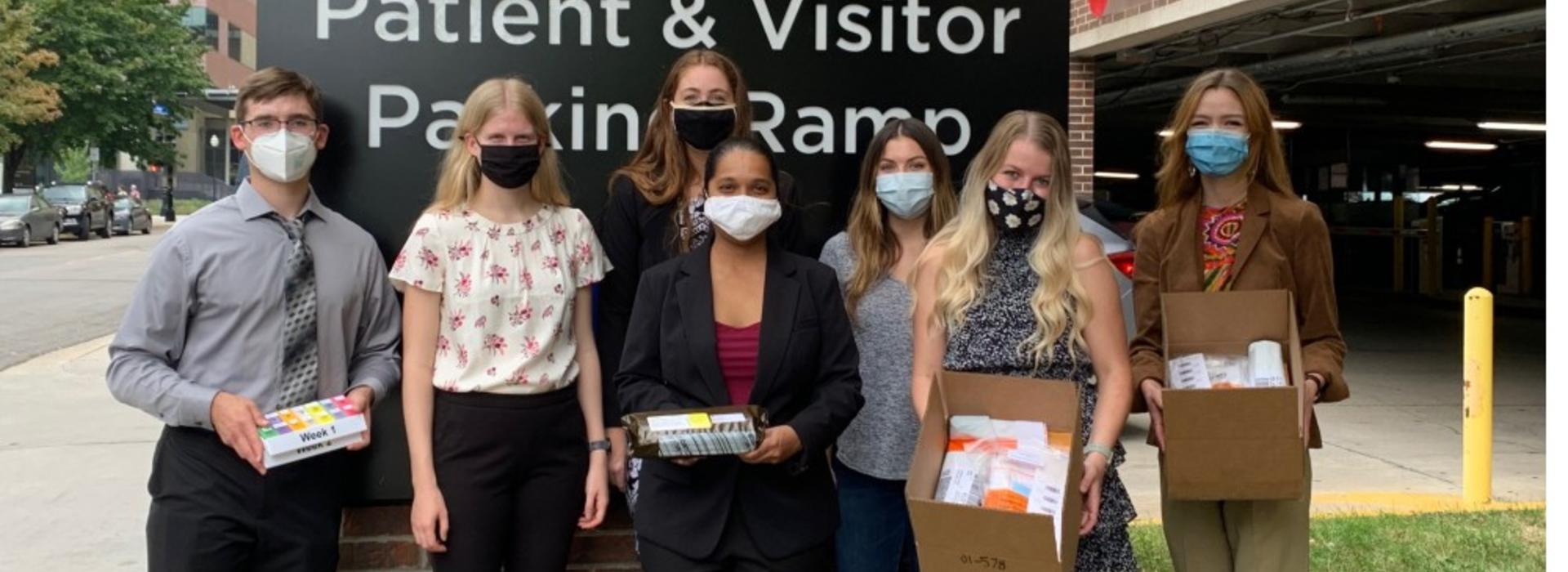
Nation’s first ivermectin clinical trial now 50 percent enrolled
The Data Safety Monitoring Board’s first early futility and efficacy analysis gives the study the green light to continue
MINNEAPOLIS/ST. PAUL (11/11/2021) — An ongoing COVID-19 clinical trial studying outpatient treatment with generic medications, including ivermectin, is now more than halfway enrolled. The COVID-OUT study was the nation’s first to begin looking at whether metformin, a medication for type 2 diabetes, fluvoxamine, an antidepressant, and ivermectin, an antiparasitic, or their combinations could serve as possible treatment options to prevent hospitalization and long COVID.
The multi-site clinical trial led by the University of Minnesota Medical School received an important green light from the Data Safety Monitoring Board (DSMB) to continue enrolling. Safety data from the study is analyzed every two weeks, and now, the DSMB’s first early futility and efficacy report said none of the study arms were futile and enrollment should continue.
“This is important because, if the data showed that one or more of the medications wasn’t protecting volunteers at all, the DSMB would halt that arm of the study,” Carolyn Bramante, MD, principal investigator of the study and an assistant professor of internal medicine and pediatrics at the U of M Medical School. “We’re actively recruiting additional participants to complete this study and give answers about whether or not these medications, along with COVID-19 vaccination, can be an important tool in preventing hospitalization, reducing viral load or lowering risk for long COVID.”
The clinical trial launched after U of M Medical School researchers identified, through computer modeling and observational studies, that outpatient metformin use may decrease the likelihood of dying from or being hospitalized for COVID-19. Their research was published in the Journal of Medical Virology and in The Lancet Healthy Longevity, which was in partnership with UnitedHealth Group’s OptumLabs. These findings, along with other prospective studies supporting the use of fluvoxamine and ivermectin, helped provide enough evidence to expand the randomized clinical trial to include all three medications as well as combination arms.
“Observational studies and test-tube experiments cannot be conclusive but do contribute to bodies of evidence,” said Bramante, who is also an internist and pediatrician with M Health Fairview. “To complete this study, we are currently enrolling volunteers nationwide through six institutions in the U.S., including in Minneapolis.”
The study is simple — volunteers are randomized to receive 14 days’ worth of either one of the three drugs individually, a placebo or a combination of metformin and fluvoxamine or fluvoxamine and ivermectin to take twice per day. Although it is placebo-controlled, Bramante says 83% of volunteers will receive a data-supported medication because of the 6-arm design. Each volunteer will track their symptoms, and after 14 days, they complete a survey.
Volunteers for the trial should be between the ages of 30 and 85 years old with a body mass index greater than or equal to 25kg/m2, or someone who is at least five feet and six inches tall and weighs more than 155 pounds. To qualify for the study, volunteers must enroll within three days after receiving a positive COVID-19 test, but the sooner the better. The study does include those who have been vaccinated and those who have not.
“Some new strains of the virus may evade immunity from some of the vaccines. Additionally, worldwide vaccine availability will take time, and not all individuals may get the vaccine. Thus, we feel we should study safe, available, inexpensive outpatient treatment options as soon as possible,” Bramante said.
Participating clinical trial sites include M Health Fairview and Hennepin Healthcare in Minneapolis, Northwestern University in Chicago, Olive View – UCLA Education & Research Institute in Los Angeles, Optum in Colorado and Indiana and University of Colorado Denver. Co-investigators on the study include Hrishikesh Belani, MD; Michelle Biros, MD; David Boulware, MD; David Leibovitz, MD; Jacinda Nicklas, MD; David Odde, PhD; Matt Pullen, MD; Mike Puskarich, MD; and Christopher Tignanelli, MD.
The study has received funding from Fast Grants, OptumLabs, Parsemus Foundation and Rainwater Charitable Foundation.
To learn more about how to qualify for this study, visit https://covidout.umn.edu/.
###
About the University of Minnesota Medical School
The University of Minnesota Medical School is at the forefront of learning and discovery, transforming medical care and educating the next generation of physicians. Our graduates and faculty produce high-impact biomedical research and advance the practice of medicine. We acknowledge that the U of M Medical School, both the Twin Cities campus and Duluth campus, is located on traditional, ancestral and contemporary lands of the Dakota and the Ojibwe, and scores of other Indigenous people, and we affirm our commitment to tribal communities and their sovereignty as we seek to improve and strengthen our relations with tribal nations. For more information about the U of M Medical School, please visit med.umn.edu.
For media requests, please contact:
Kat Dodge
Communications Manager
University of Minnesota Medical School
kdodge@umn.edu